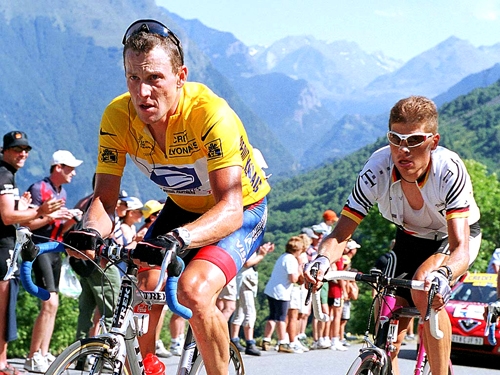
She says: Yes.
Aileen Ormoc
Sports Editor
Plain and simple, if Lance Armstrong is not guilty of using performance-enhancing drugs, he should fight the charges.
If he wants to hold onto any integrity as a professional athlete, he needs to prove that the USADA has no grounds to charge him with doping.
The fact of the matter is Armstrong has never tested positive for drug use.
The U.S. Anti-Doping Ageny has only sought Armstrong out on allegations of drug use are through supposed eyewitnesses who claim he used banned blood transfusions, steroids, testosterone, and the blood booster, erythropoietin (EPO), to win all seven of his Tour de France titles. None of this is based on concrete evidence, but rather hearsay.
So where is all the “evidence?”
President of the International Cycling Union, Pat McQuaid, says they have received no proof of Armstrong’s alleged drug use from the USADA. And it has been over a month since Armstrong refused to fight the doping allegations.
Armstrong’s reasoning for refusing to fight the charges is not strong enough.
He says that he wants to protect his family from all the negative media attention, and that he wants to focus on improving the Lance Armstrong Foundation for cancer support.
However, there are more pros than cons for Armstrong if he were to go ahead and battle this case. The cons if he loses: he is stripped of all seven of his Tour de France titles, he is banned from competing in cycling competitions in the future, and all the money he has won is taken from him. The pros: he becomes the poster boy for athletes wrongfully accused of doping.
If he came out on top, he could follow in the footsteps of other high-profile athletes wrongfully accused of doping, who won their cases in the end.
Last June, Roger Clemens of the New York Yankees was slammed in Senator George Mitchell’s 2007 report on the use of performance-enhancing drugs. Major League Baseball identified Clemens as a steroids and human growth hormone user. These claims were not based on positive drug tests but rather on speculation surrounding Clemens’ alleged drug use by other players and training specialists—again, more hearsay. In the end, Clemens was acquitted of all charges related to drug use.
Although Armstrong argues his refusal to fight the charges in no way implicates him, it definitely doesn’t do his reputation any good. More specifically, the doping charges cast a negative light on the Lance Armstrong Foundation. For Armstrong to simply refuse fighting the charges raise questions related to his foundation, about whether or not the money is really going towards cancer research and support.
Armstrong’s decision will now leave many people wondering if he was ever a credible, honest athlete.
He says: No.
Arshad Desai
Contributor
Last month Lance Armstrong was stripped of his seven Tour de France championship titles after the United States Anti-Doping Agency accused the cyclist of doping.
Armstrong, who has been at the heart of a doping scandal ever since his first Tour de France win back in 1999, decided to not challenge this most recent accusation.
Some have found Armstrong’s choice to refuse testing to be an admission of guilt. In my humble opinion, however, it was a smart decision by Armstrong because he is clearly in the midst of a witch hunt.
The USADA is responsible for testing Olympic athletes for the use of performance-enhancing drugs. The USADA’s evidence supporting their accusations against Armstrong is based on testimonials from Armstrong’s former teammates. This, of course, ignored the fact that the cyclist has passed over 500 drug tests, and yet he is still somehow being portrayed as guilty by the USADA.
When this news broke in June, Armstrong was in Montreal, and stated on his website that he and the Lance Armstrong Foundation have a more important fight on their hands: cancer.
I believe that Armstrong’s focus to help cure cancer justifies his not wanting to continue to participate in this drug-testing witch hunt, seeing as how he has passed that test 500 times already—a simply staggering number.
What more does he have to prove?
He overcame cancer, an amazing feat in and of itself, then went on to win cycling’s most prestigious championship seven times. I fail to see what else there is for Lance to prove about the legitimacy of his victories.
His decision to not continue to be tested is not an admission of guilt, as some people think, because as Armstrong states, “There comes a point in every man’s life when he has to say, ‘Enough is enough.’ For me, that time is now.”
Armstrong took the high road and decided not to fight this time, and to me, there is nothing wrong with that.
Essentially, cycling is a sport that has had, and will likely continue to have, a myriad of doping convictions. It’s time for the next doping witch to step up and fill Armstrong’s cycling shoes.


